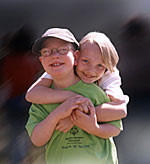Learning, Cognition and Memory in Mental Retardation and Developmental Disabilities--The Branch supports neuroanatomic, neurophysiologic, structural and functional imaging, and neuropsychologic studies of the processes involved. Studies of attention, executive function, working memory, problem solving, and self-awareness are especially encouraged. Also needed is research on the effect of teratogens, such as parental alcohol or drug use on cognitive and behavioral development. Elucidation of critical periods in development across the lifespan is needed.
Family and Community Relationships in Mental Retardation and Developmental Disabilities--Because of the national movement to provide home and family care rather than institutionalization for persons with mental retardation or other developmental disabilities, research on family and community variables is of special interest. Research on the processes of mutual influence between persons with mental retardation or other developmental disabilities and other members of their families or communities is encouraged. Studies of racial and ethnic influences on family adaptation and community acceptance and on differential access to health care are needed.
Communication and Language in Mental Retardation and Developmental Disabilities--The impact of motor and sensory limitations on communicative ability in mental retardation and other developmental disabilities needs to be addressed. Research on verbal and nonverbal communication is of major interest. Studies of precursors of language and of the transition from prelinguistic to linguistic communication are of special interest. Research is needed on the development of nonverbal communication and on the communicative functions of aberrant behavior.
Social and Effective Development in Mental Retardation and Developmental Disabilities--Recent advances in understanding the neurobiology of social and emotional behavior make this an important area for research. Human and animal studies are needed of the psychobiological and behavioral factors and processes that influence social and emotional development and expression in mental retardation and other developmental disorders. Treatment studies are also needed.
Self-Injurious Behavior--A significant percentage of people with mental retardation exhibit some form of SIB, which often leads to social isolation and restrictive treatments. SIB is among the most damaging of all behavior problems exhibited by people with mental retardation, autism, and related developmental disorders. There is an urgent need for studies into the pathophysiology and behavioral deficits associated with SIB and other repetitive behaviors (including animal models), and into the development of therapeutic strategies.
Autism and Autism Spectrum Disorders (ASDs)--Autism is a complex neurodevelopmental disability affecting communication, social functioning, and adaptive behavior. Human and animal research including genetic, neuroanatomic, neurophysiologic, immunologic, neurochemical, and neuropsychologic studies are needed to elucidate the etiology and pathophysiology of this disorder. Research on early diagnosis and identification of co-morbid conditions is also encouraged as are studies of effective behavioral and psychopharmacologic interventions. To learn more about the NICHD's efforts in autism research, visit the Autism Research at the NICHD Web site.
